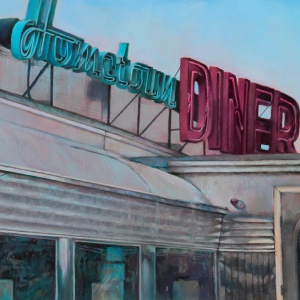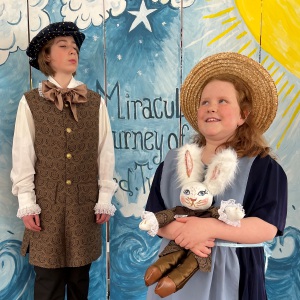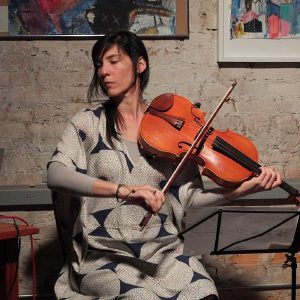Local artist with ties to Prince mourns his death
| Published: 04-25-2016 7:01 PM |
The Artist Formerly Known As Prince. The Purple Yoda From Minnesota. Jamie Starr. The world knew musician Prince Rogers Nelson by many names, most notably, of course, Prince. But for a few magical months in a cold Minnesota winter nearly 30 years ago, Ingrid Chavez of Peterborough knew him simply as Dexter.
Chavez was a young single mother in Minneapolis, making music on four-track and hoping to breakthrough. She’d seen Prince around, of course – he was one of the biggest artists in the world at the time – and they’d crossed paths, but never spoken. One night, she met a friend at a bar, looked around, and there he was, in all his trademark splendor, with big, heart-shaped mirror bracelets adorning his wrists.
“He kind of had his eye on me that night,” Chavez said, “and so I sat down at the bar and I wrote him a little note and it said, ‘Hi, remember me? Probably not because we’ve never met. Smile. I love it when you smile.’ And I signed it ‘Gertrude.’”
She handed off the note and it found its way over to the quiet, purple-clad enigma. He seemed intrigued. Prince took off one of those mirrored bracelets, put it on her wrist and said, “Hi Gertrude, I’m Dexter.”
“And that’s who we were for the winter,” Chavez said. “He was Dexter and I was Gertrude.”
The two drove out to Paisley Park, Prince’s home and recording studio. Chavez sat in the front, Prince in the back, mirror flipped down, gazing into each other’s eyes. That night, Prince showed her to the sound booth, gave her a guitar, and told her to pursue her passion and make some music.
“I didn’t really play guitar,” Chavez said, “but I knew how to make sounds on it, and I would flip the tape so it was backwards, do backwards vocals, and you know, he thought it was crazy. But he thought it was crazy enough to be unique.”
Unique. Perhaps there’s no better word to describe the musician who blurred lines of of gender and sexuality, portrayed the very image of masculinity, while standing 5’2” in purple heels, and displayed a virtuosity on guitar, piano and vocals that is unparalleled. And he surrounded himself with unique people, as well.
Article continues after...
Yesterday's Most Read Articles
“He has the ability to see the potential in creative people,” Chavez said, as evidenced by his work with Chavez, Morris Day and the Time and his most recent protege, Judith Hill. “I think he really enjoyed helping people make their dreams come true.”
Prince certainly helped Chavez’s dreams come true. The two recorded an album, “May 19, 1992,” together, with Prince playing instrumentals under Chavez’s poetry; she’d also appear on his album “Lovesexy” and co-star with him in the movie “Graffiti Bridge.” All this put her in a position to make what may have been her biggest breakthrough – going to Los Angeles, working with Lenny Kravitz and writing “Justify My Love,” which would become a smash hit for Madonna. And, it all stemmed from that one fateful night.
“That night changed my life forever,” Chavez said. “All the things that spiraled out of that night – I never would have married who I married, I never would have met Lenny Kravitz and written “Justify My Love” – none of that. The “Lovesexy” album never would have happened. I wouldn’t have had these two daughters, I wouldn’t have married David [Sylvian, an English musician she’d toured with following her album release]. What would my life have been?”
That first night was monumental for Prince as well.
“Apparently, he was going through some spiritual epiphany,” Chavez said. Prince called his publicist and told her: “I met an angel tonight.” He called his manager and said he was canceling his soon-to-be-released album, which eventually became known as “The Black Album.”
That sort of particular, peculiar behavior was just atypical enough to be typical for the man regarded as a musical genius, a man who lived and breathed music, a man who thrilled millions of fans the world over as they grew up listening to his music over the course of nearly four decades.
“The way he’s touched his fans is really unique,” Chavez said. “The amount of love and devotion that they have to him is just really touching and unbelievable.”
Last Thursday, Chavez got a text from an old friend in Minneapolis. That text was followed by a slew of Facebook messages, and before long, “my phone was just blowing up,” Chavez said. Soon, the world knew: Prince, one the greatest musicians of all time, had been found dead at 57, collapsed in an elevator at Paisley Park.
“It’s just so sad,” Chavez said. “I just think of him being in an elevator collapsing and being alone, that just breaks my heart.”
It had been years since Chavez had been in contact with Prince, though a reunion was likely in the near future, as she’s working on a re-release of “May 19, 1992” for its upcoming 25-year anniversary. She’d declined an invite to his April show in Atlanta – a huge regret, as it turned out to be his final performance. Chavez can always look back on that one Minnesota winter, a few, too-short months of hanging out in their pajamas, playing basketball, taking drives, making pancakes and recording music. But, she said, she’ll always wish she could have spoken to him one more time.
“I would want him to know how important he really is,” Chavez said, “and how much he changed and affected my life. How much he means to me and that my life wouldn’t have been the same without him.”

 Gnome Notes: Emerson Sistare – Amor Towles weaves tapestry in ‘Table for Two: Fictions’
Gnome Notes: Emerson Sistare – Amor Towles weaves tapestry in ‘Table for Two: Fictions’ Jaffrey Civic Center hosting Heart of the Arts
Jaffrey Civic Center hosting Heart of the Arts  Project Shakespeare to present ‘The Miraculous Journey of Edward Tulane’
Project Shakespeare to present ‘The Miraculous Journey of Edward Tulane’ The Thing in the Spring returns May 16
The Thing in the Spring returns May 16
